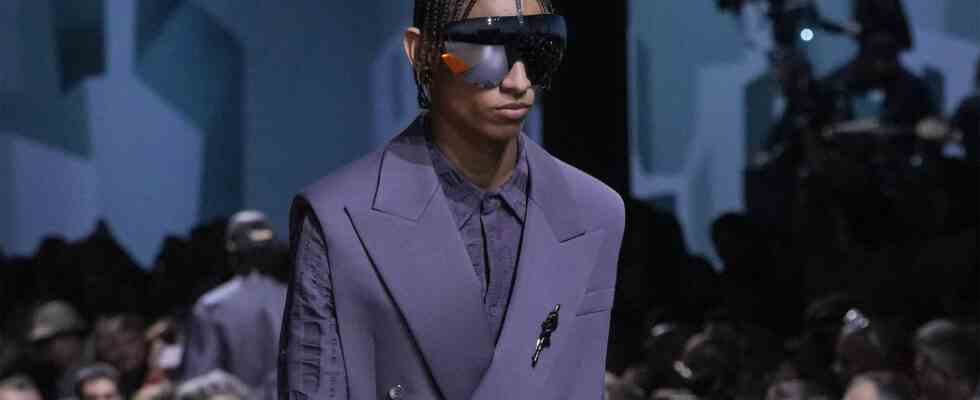Status: 01/27/2023 3:24 p.m
Behind LVMH are brands like Dior, Louis Vuitton and Rimowa. The French luxury goods group is the most valuable listed company in Europe, and its boss is the richest man in the world. There is little evidence of economic worries on the luxury market.
The French luxury goods giant LVMH managed a record year in 2022. Both the turnover and the profit of the group increased in the past year in double-digit percentage terms. Last year, LVMH increased its sales by almost a quarter – to around 79.2 billion euros, exceeding analysts’ expectations. The bottom line is that the group earned almost 14.1 billion euros, 17 percent more than in 2021.
And in January, the group also cracked the mark of 400 billion dollars on the market – with a market capitalization of around 406 billion euros, LVMH is currently by far the most valuable group in the euro zone. It was followed by the chip supplier ASML with just under 248 billion euros in second place.
The rapid development of the company even ensured that LVMH co-founder and CEO Bernard Arnault replaced Tesla boss Elon Musk last year as the richest person in the world. His net worth is estimated at $191 billion by Bloomberg, while Forbes estimates Arnault and his family’s net worth at $214 billion.
Louis Vuitton sales driver by LVMH
LVMH is a conglomerate of fashion, jewellery, cosmetics and spirits. 75 luxury brands are united under the umbrella of the French group – whether Dom Pérignon, Tiffany & Co. or Bulgari, they all belong to the group. But the most important segment related to fashion and leather goods in particular grew last year: LVMH increased its sales by a fifth with brands such as Louis Vuitton, Marc Jacobs and Rimowa. All other parts of the company also achieved a double-digit percentage increase in sales.
Among the many brands of the group, Louis Vuitton in particular stood out. The figures from the past year show the attraction the brand exerts on customers: With more than 20 billion euros – according to the company for the first time – it is responsible for a quarter of the group’s sales. In the fashion and leather goods segment, Louis Vuitton accounts for more than half of sales. The remaining approximately 18 billion euros are contributed by the many other brands such as Loewe, Fendi, Christian Dior, Kenzo and Givenchy.
Advertisement for Louis Vuitton bags in Shanghai
Image: picture alliance / CFOTO
Exclusivity as a trademark
The retail segment (Selective Retailing), in which LVMH includes its perfumery chain Sephora and the duty-free shops of the DFS Group, also grew strongly. The latter are concentrated in Asia and the Pacific region. Now that international air traffic has returned to normal, more people are traveling again and going on a shopping spree just before departure.
“Our products sell incredibly well, even though they’re hard to find,” said CEO Bernard Arnault, emphasizing the group’s exclusivity. The company had already used this strategy after taking over the Cologne-based luggage manufacturer Rimowa: Whereas the striking aluminum suitcases were previously also available in shopping centers and normal luggage shops, they can now only be bought in a few boutiques or online from the manufacturer.
The perfume business was the only segment to experience a drop in profits. According to the information, this was mainly due to the fact that LVMH only wants to sell its fragrance creations in selected shops.
Important business in China
The European luxury heavyweight benefits from the fact that the travel business is increasingly recovering. Above all, demand in Europe, the USA and Japan has increased significantly. The management is convinced that things would have gone even better without the strict corona measures in China: the lack of tourism was particularly noticeable in the shops in Hong Kong and Macau.
Luxury spending in China has fallen from 33 percent of the global personal luxury goods market in 2019 to just 17 percent last year, according to estimates by consultancy Bain. However, analysts are expecting a strong return from Chinese buyers – the main source of profits for luxury companies before the pandemic – after three years of lockdowns to further boost the industry this year. China is projected to become the largest luxury market by 2025.
The market is growing
However, the easing in China also gives other luxury goods groups hope for growing sales and gives their shares a boost. LVMH competitor Kering – also a French company – has risen by more than 15 percent since the start of the year. Kering, which presented figures in mid-February, includes the brands Gucci, Saint Laurent and Balenciaga. The luxury fashion manufacturer Hermés was also up 16 percent this month, and the US group Estée Lauder was up eight percent.
In a study by Bain with the Italian luxury industry association Altagamma, it is assumed that the luxury market should be more resilient to a recession in 2023 than it was during the financial crisis. Depending on the overall economic situation, the market could grow between three and five percent or between six and eight percent this year.

